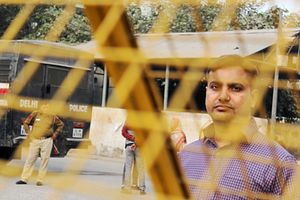Currently, the Unlawful Activities (Prevention) Act (UAPA) is the primary anti-terrorism law in force in India. Enacted by Parliament in 1967, this law increased the period of detention without bail and changed the presumption of innocence to that of guilt where certain conditions were met. UAPA has been criticized for the way in which it has been implemented and misused against minorities, especially Muslims.
This photo essay brings to you the stories of two people who were the victims of such police misconduct. Mohammad Aamir Khan and Irshad Ali were both “kidnapped” by the police and later charged with terrorism without any solid evidence. Years later, both were acquitted, but their lives were forever altered by the false charges.
Mohammad Aamir Khan
Mohammad Aamir Khan was just like any other 18-year-old boy living in Old Delhi. Fond of flying kites and indulging in mischief like all boys of his age, Aamir was “kidnapped” (as he calls it) from Old Delhi as he was on his way to buy medicine for his mother in 1998. He says for eight days he was tortured and illegally detained by the police, who forced him to sign about 500 sheets of blank paper. Later Aamir found out that he was accused of planting bombs in various places in and around Delhi and thus began his long battle for justice.
Aamir spent 14 years in prison, a harrowing time for him and his parents. His father, Mohammad Hashim Khan, had to figure out the intricacies of the judiciary all by himself. He spent the last days of his life trying to find his son a lawyer and travelling from one court to the next to be present for his son’s trial. After his father’s death, Aamir’s mother, Miamuna Bi, had to bear the burden of helping her son. Elderly, uneducated, and unaccustomed to travelling alone, Miamuna Bi was suddenly swallowed by the labyrinth of the Indian judiciary. This took a toll on her health and she was paralyzed in 2010.
In 2012, when he was acquitted of all charges, Aamir found himself walking out into a completely different world. The thing about his ordeal that hurts Aamir the most is not having had the chance to take care of his parents during their old age. Once Aamir was released in 2012, he married Aliya, who waited 14 years to marry him.
Today, Aamir works for an NGO, Aman Biraderi and lives with his wife, Aliya and daughter, Anusha, in Old Delhi.
Irshad Ali
Irshad Ali was “kidnapped” (as he calls it) by the Special Cell on December 12, 2005 and was produced before court two months later, on February 9, 2006. An auto driver living in Sultanpuri, North Delhi, Irshad suddenly found himself facing charges of terrorism and waging war against his country. The Special Cell accused him of being a member of the Al-Badr terrorist outfit; however, the Central Bureau of Investigation (CBI) uncovered a totally different story while investigating his case. The CBI’s Enquiry Report revealed that Irshad Ali was actually forced to work as a police informer and when he refused to oblige the intelligence agency (IB), he was “kidnapped” and held in illegal detention for over two months.
He was released on bail four-and-a-half years later and was acquitted of all charges in 2016. Today, Irshad works as a taxi driver. He struggles to get clients and spends most of his time at home with his wife, Shabana, and two sons, Waqar and Imran.
The government of India provides rehabilitation and support to surrendered militants in the northeast part of the country. This is what baffles Aamir and Irshad the most. “If the government can pay and rehabilitate surrendered militants, why can’t they give us, the acquitted, a decent compensation for ruining our lives?” they ask.
Aamir received 500,000 Indian rupees ($7,260) in April this year from the Delhi Police. But many, including Aamir, believe it is too little, too late a compensation for spending one’s entire youth in prison.
Intifada P Basheer is a freelance journalist based in New Delhi. She is currently pursuing her Masters in journalism from AJK MCRC, Jamia Millia Islamia, New Delhi.



















































